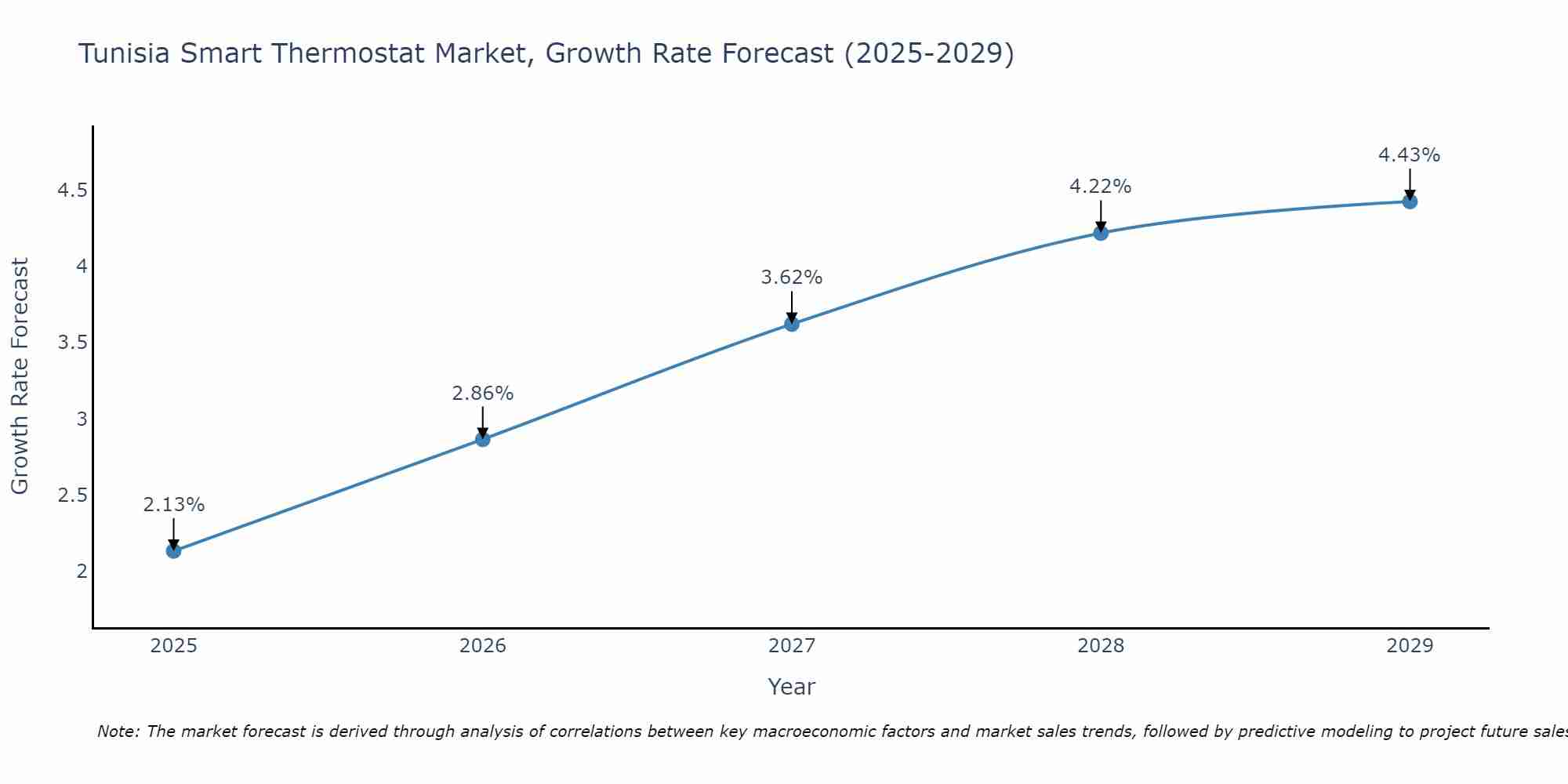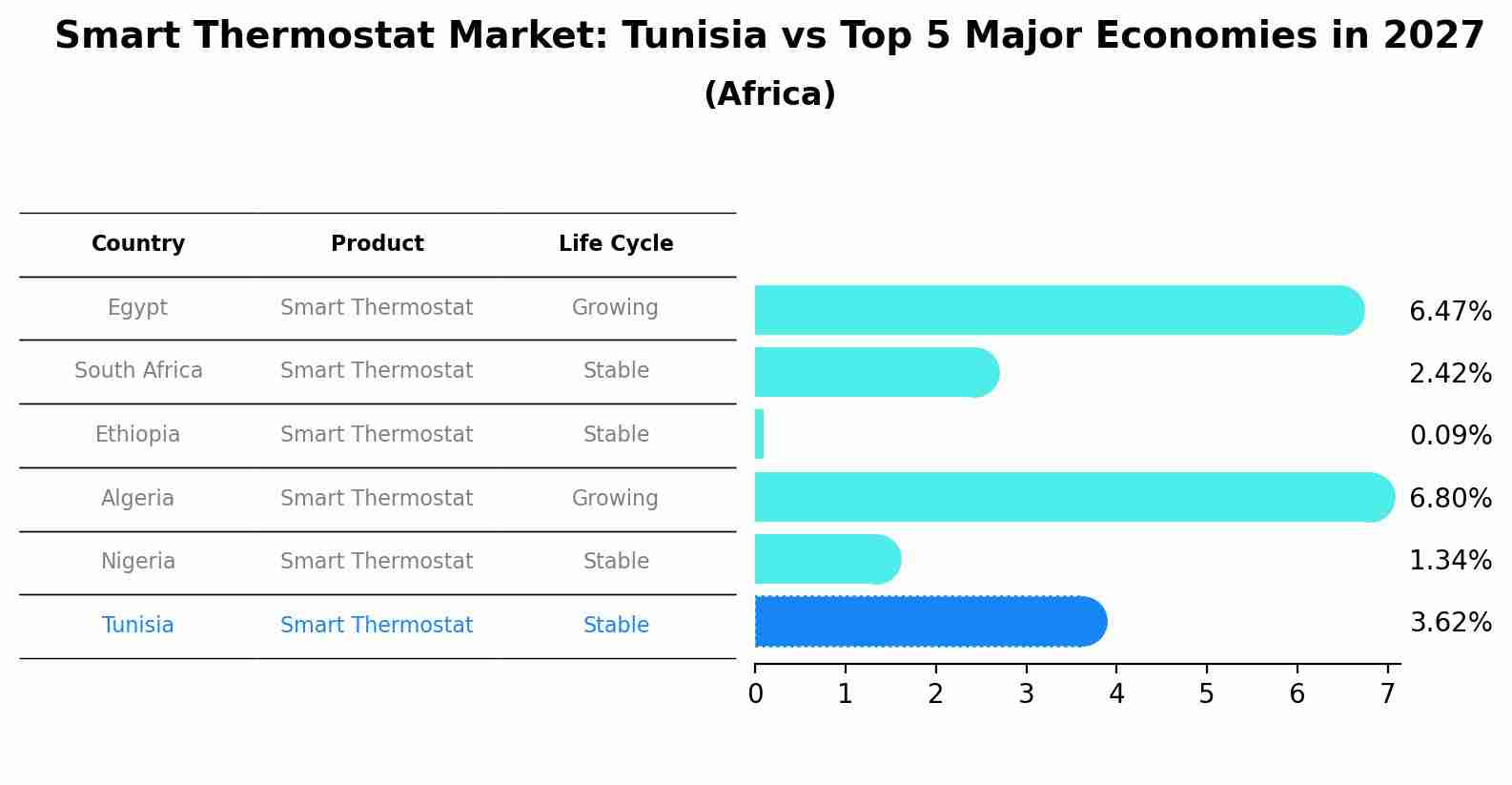Tunisia Smart Thermostat Market Outlook | Value, Revenue, Growth, Size, Industry, Companies, Forecast, Share, Trends, Analysis & COVID-19 IMPACT
| Product Code: ETC369534 | Publication Date: Aug 2022 | Updated Date: Jul 2025 | Product Type: Market Research Report | |
| Publisher: 6Wresearch | Author: Summon Dutta | No. of Pages: 75 | No. of Figures: 35 | No. of Tables: 20 |
Tunisia Smart Thermostat Market Size Growth Rate
The Tunisia Smart Thermostat Market is likely to experience consistent growth rate gains over the period 2025 to 2029. Commencing at 2.13% in 2025, growth builds up to 4.43% by 2029.

Smart Thermostat Market: Tunisia vs Top 5 Major Economies in 2027 (Africa)
Tunisia's Smart Thermostat market is anticipated to experience a stable growth rate of 3.62% by 2027, reflecting trends observed in the largest economy Egypt, followed by South Africa, Ethiopia, Algeria and Nigeria.

Tunisia Smart Thermostat Market Synopsis
The Tunisia Smart Thermostat Market is witnessing steady growth driven by increasing awareness of energy efficiency and smart home technologies among consumers. The market is characterized by the rising adoption of smart thermostats in residential and commercial sectors to optimize energy consumption and reduce utility bills. Key players in the market are introducing innovative products with features such as remote access, voice control, and learning algorithms to enhance user experience. Government initiatives promoting energy conservation and smart building technologies are also boosting market growth. The market is expected to further expand as consumers seek convenient and cost-effective solutions for managing their home heating and cooling systems efficiently. Overall, the Tunisia Smart Thermostat Market presents opportunities for players to cater to the growing demand for smart home solutions in the country.
Tunisia Smart Thermostat Market Trends
The Tunisia Smart Thermostat Market is experiencing a growing demand for energy-efficient solutions driven by increasing awareness of environmental sustainability and the need to reduce energy consumption. Consumers are increasingly looking for smart thermostats that offer features such as remote access, energy usage monitoring, and compatibility with smart home systems. Integration with artificial intelligence and machine learning technologies is also a key trend, allowing for more personalized and automated temperature control. Furthermore, the market is witnessing a rise in partnerships between smart thermostat manufacturers and energy providers to offer bundled energy management solutions. Overall, the Tunisia Smart Thermostat Market is poised for continued growth as consumers seek innovative ways to optimize energy usage and enhance home comfort.
Tunisia Smart Thermostat Market Challenges
The Tunisia Smart Thermostat Market faces several challenges, including limited awareness and understanding of smart thermostat technology among consumers, leading to slower adoption rates. Additionally, the high initial cost of smart thermostats compared to traditional thermostats is a barrier for many potential customers. The lack of standardized regulations and guidelines for smart thermostat installation and usage also hinders market growth, as it creates uncertainty for both consumers and manufacturers. Furthermore, the limited availability of compatible smart home devices and infrastructure in Tunisia poses a challenge for integrating smart thermostats into smart home ecosystems. Overall, overcoming these challenges will require concerted efforts from manufacturers, government bodies, and industry stakeholders to drive awareness, affordability, and interoperability in the Tunisia Smart Thermostat Market.
Tunisia Smart Thermostat Market Investment Opportunities
The Tunisia Smart Thermostat Market presents promising investment opportunities due to the increasing awareness of energy efficiency and the growing adoption of smart home technology in the country. With the government`s focus on promoting sustainable practices and reducing energy consumption, there is a rising demand for smart thermostats that offer advanced features such as remote temperature control, energy usage monitoring, and integration with smart home ecosystems. Investors can capitalize on this trend by investing in companies that manufacture or distribute smart thermostats in Tunisia, as well as exploring partnerships with local utility companies for potential collaborations. Additionally, offering innovative solutions tailored to the Tunisian market`s specific needs and preferences can help investors differentiate themselves and gain a competitive edge in this growing sector.
Jordan Agar Market Government Policies
The Tunisia government has implemented various policies to support the Smart Thermostat Market, aiming to promote energy efficiency and sustainability. These policies include offering financial incentives and subsidies for the adoption of smart thermostats, implementing regulations and standards to encourage the development and deployment of energy-efficient technologies, and promoting public awareness campaigns to educate consumers on the benefits of smart thermostats. Additionally, the government has been actively collaborating with industry stakeholders to drive innovation and research in smart thermostat technologies, with a focus on reducing energy consumption and greenhouse gas emissions. Overall, these policies signal a positive environment for the growth of the Smart Thermostat Market in Tunisia, aligning with the country`s goals for sustainable development and energy conservation.
Tunisia Smart Thermostat Market Future Outlook
The Tunisia Smart Thermostat Market is expected to experience steady growth in the coming years due to increasing awareness of energy efficiency, rising adoption of smart home technologies, and government initiatives promoting sustainable living. With a growing focus on reducing energy consumption and carbon emissions, consumers are increasingly turning to smart thermostats to optimize their heating and cooling systems. The market is also benefiting from advancements in technology, such as AI integration and remote access capabilities, making smart thermostats more convenient and user-friendly. Additionally, the ongoing trend of smart home automation and the development of smart cities in Tunisia are anticipated to further drive the demand for smart thermostats, positioning the market for continued expansion and innovation.
Key Highlights of the Report:
- Tunisia Smart Thermostat Market Outlook
- Market Size of Tunisia Smart Thermostat Market, 2021
- Forecast of Tunisia Smart Thermostat Market, 2031
- Historical Data and Forecast of Tunisia Smart Thermostat Revenues & Volume for the Period 2018 - 2031
- Tunisia Smart Thermostat Market Trend Evolution
- Tunisia Smart Thermostat Market Drivers and Challenges
- Tunisia Smart Thermostat Price Trends
- Tunisia Smart Thermostat Porter's Five Forces
- Tunisia Smart Thermostat Industry Life Cycle
- Historical Data and Forecast of Tunisia Smart Thermostat Market Revenues & Volume By Type for the Period 2018 - 2031
- Historical Data and Forecast of Tunisia Smart Thermostat Market Revenues & Volume By Wireless for the Period 2018 - 2031
- Historical Data and Forecast of Tunisia Smart Thermostat Market Revenues & Volume By Wireless for the Period 2018 - 2031
- Historical Data and Forecast of Tunisia Smart Thermostat Market Revenues & Volume By End-User Vertical for the Period 2018 - 2031
- Historical Data and Forecast of Tunisia Smart Thermostat Market Revenues & Volume By Residential for the Period 2018 - 2031
- Historical Data and Forecast of Tunisia Smart Thermostat Market Revenues & Volume By Commercial for the Period 2018 - 2031
- Tunisia Smart Thermostat Import Export Trade Statistics
- Market Opportunity Assessment By Type
- Market Opportunity Assessment By End-User Vertical
- Tunisia Smart Thermostat Top Companies Market Share
- Tunisia Smart Thermostat Competitive Benchmarking By Technical and Operational Parameters
- Tunisia Smart Thermostat Company Profiles
- Tunisia Smart Thermostat Key Strategic Recommendations
Frequently Asked Questions About the Market Study (FAQs):
- Single User License$ 1,995
- Department License$ 2,400
- Site License$ 3,120
- Global License$ 3,795
Search
Thought Leadership and Analyst Meet
Our Clients
Related Reports
- Canada Oil and Gas Market (2026-2032) | Share, Segmentation, Value, Industry, Trends, Forecast, Analysis, Size & Revenue, Growth, Competitive Landscape, Outlook, Companies
- Germany Breakfast Food Market (2026-2032) | Industry, Share, Growth, Size, Companies, Value, Analysis, Revenue, Trends, Forecast & Outlook
- Australia Briquette Market (2025-2031) | Growth, Size, Revenue, Forecast, Analysis, Trends, Value, Share, Industry & Companies
- Vietnam System Integrator Market (2025-2031) | Size, Companies, Analysis, Industry, Value, Forecast, Growth, Trends, Revenue & Share
- ASEAN and Thailand Brain Health Supplements Market (2025-2031) | Strategy, Consumer Insights, Analysis, Investment Trends, Opportunities, Growth, Size, Share, Industry, Revenue, Segments, Value, Segmentation, Supply, Forecast, Restraints, Outlook, Competition, Drivers, Trends, Demand, Pricing Analysis, Competitive, Strategic Insights, Companies, Challenges
- ASEAN Bearings Market (2025-2031) | Strategy, Consumer Insights, Analysis, Investment Trends, Opportunities, Growth, Size, Share, Industry, Revenue, Segments, Value, Segmentation, Supply, Forecast, Restraints, Outlook, Competition, Drivers, Trends, Demand, Pricing Analysis, Competitive, Strategic Insights, Companies, Challenges
- Europe Flooring Market (2025-2031) | Outlook, Share, Industry, Trends, Forecast, Companies, Revenue, Size, Analysis, Growth & Value
- Saudi Arabia Manlift Market (2025-2031) | Outlook, Size, Growth, Trends, Companies, Industry, Revenue, Value, Share, Forecast & Analysis
- Uganda Excavator, Crane, and Wheel Loaders Market (2025-2031) | Strategy, Consumer Insights, Analysis, Investment Trends, Opportunities, Growth, Size, Share, Industry, Revenue, Segments, Value, Segmentation, Supply, Forecast, Restraints, Outlook, Competition, Drivers, Trends, Demand, Pricing Analysis, Competitive, Strategic Insights, Companies, Challenges
- Rwanda Excavator, Crane, and Wheel Loaders Market (2025-2031) | Strategy, Consumer Insights, Analysis, Investment Trends, Opportunities, Growth, Size, Share, Industry, Revenue, Segments, Value, Segmentation, Supply, Forecast, Restraints, Outlook, Competition, Drivers, Trends, Demand, Pricing Analysis, Competitive, Strategic Insights, Companies, Challenges
Industry Events and Analyst Meet
Whitepaper
- Middle East & Africa Commercial Security Market Click here to view more.
- Middle East & Africa Fire Safety Systems & Equipment Market Click here to view more.
- GCC Drone Market Click here to view more.
- Middle East Lighting Fixture Market Click here to view more.
- GCC Physical & Perimeter Security Market Click here to view more.
6WResearch In News
- Doha a strategic location for EV manufacturing hub: IPA Qatar
- Demand for luxury TVs surging in the GCC, says Samsung
- Empowering Growth: The Thriving Journey of Bangladesh’s Cable Industry
- Demand for luxury TVs surging in the GCC, says Samsung
- Video call with a traditional healer? Once unthinkable, it’s now common in South Africa
- Intelligent Buildings To Smooth GCC’s Path To Net Zero


















